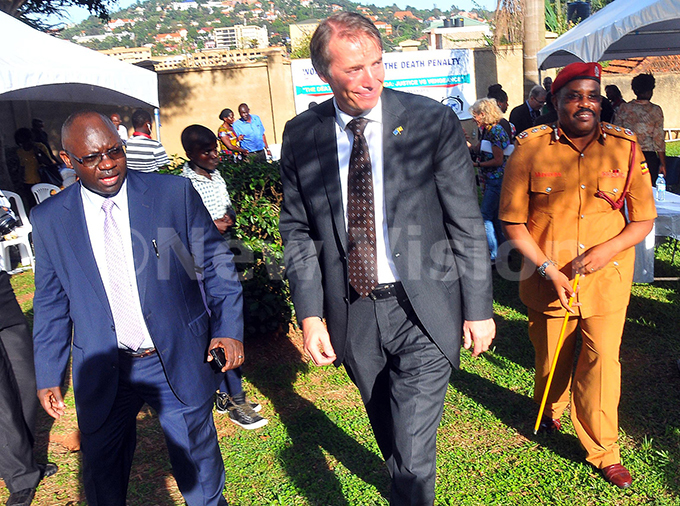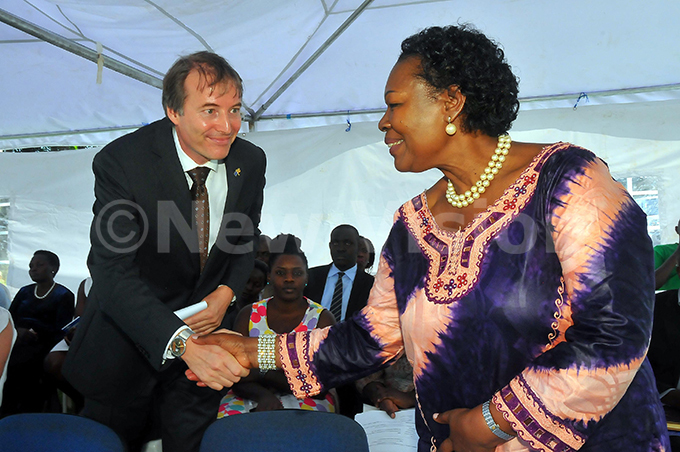EU calls for adoption of the National Legal policy
Oct 12, 2016
During his visit to Luzira, the Ambassador discovered that among the numerous indigents that urgently need free legal services include inmates on death sentences as well as prisoners serving life sentences.

The European Union Head of Delegation His Excellence Ambassador Kristian Schmidt has appealed to Government to consider adoption of the National Legal policy to ensure necessary services for indigent Ugandans.
"The poor are being oppressed because there is no one to assist them access justice, yet the Constitution provides for free legal representation at the expense of the state in capital offences carrying sentences of death and or imprisonment for life," Kristian observed.
Kristian made this call while commemorating the 14th World Day against the Death Penalty held at the Foundation for Human Rights Initiatives head offices at Kabalagala on yesterday.
Kristian observed that, "the National Legal Aid Policy Bill has been in the shelves for two years , so there is need for the Minister of Justice and Constitutional Affairs to present the Bill to Parliament so that it is discussed and passed into law to ensure the poor access justice."
 The Executive Director Human Right Inniative Livingstone Ssewanyana,the head of European Union Kristian Schmid, and the Commissioner Uganda Prison Robert Bananura after the World Day Against the Death Penalty celebrations at the Foundation for Human Rights Initiative in Kampala Oct 10 2016.Photo by Wilfred Sanya
The Executive Director Human Right Inniative Livingstone Ssewanyana,the head of European Union Kristian Schmid, and the Commissioner Uganda Prison Robert Bananura after the World Day Against the Death Penalty celebrations at the Foundation for Human Rights Initiative in Kampala Oct 10 2016.Photo by Wilfred Sanya
During his visit to Luzira, the Ambassador discovered that among the numerous indigents that urgently need free legal services include inmates on death sentences as well as prisoners serving life sentences.
Kristian emphasized that the EU strongly opposes the death penalty in all circumstances, and works towards the universal abolition of the death penalty, if necessary by lobbying for the immediate establishment of a moratorium which paves the way for its abolition.
Dr. Lawrence Sewanyana the Executive Director Foundation for Human Rights Initiative (FHRI) stressed that legal aid is not available to avast majority of Ugandans and hence deny inmates justice.

"There are appeals courts with judges missing, there is corruption and many files have gone missing from courts of law that curtail people from having justice." Sewanyana narrates.
Ex-convict speaks out on death penalty
Edward Mpagi 61, from Masaka says he was innocently accused of murdering which nearly put him put him death penalty and called for a ban of the punishment."In 1981, we had land wrangle with arrival family in Masaka, I was accused of murdering our neighbor on grounds of the grudges we had in the past." Mpagi said.
Mpagi adds that the person he was accused of murdering was still alive but the court had ruled that he was dead which kept him in prison cells for 18 years. "It was very unfortunate that I did not reconcile with someone I was accused of murdering, he died a few weeks after my 18 years tenure at Luzira prison." Mpagi added.
He narrates that due to political tension in 1980s, he luckily didn't face the hangman. "Many people were hanged to death in 1991,93,96,99 to whom we shared sentences and I would be innocently dead by now." He noted.
Mpagi called onto government to drop the death sentence adding that there are many innocent people like him who have been convicted and would face death penalties.
Child of death penalty victim speaks out
James Bob Twesigye14 told new vision that he learnt about his father's death sentence at 4 years which made him cry."I asked mum about my father and she instead took me to my aunt because she could not explain to me. Aunt lied to me that she was from prison which is not true." Twesigye says.
Twesigye adds that he yearns to see his dad as some of his friends at home ask him about his dad.
"The law should not separate us from our dads and therefore the death penalty should be banned." Twesigye says.
Currently, 155 out of 195 independent states have abolished the death penalty in law or practice. 105 states have fully abolished the death penalty including 19 from Africa, 6 have abolished for ordinary crimes, 48 states have abolished in practice while 36 are executing.
Although Uganda last carried out executions in 1999, courts still sentence people to suffer death. Uganda's Prisons currently accommodate 198 death row inmates of which 11 are female while 187 are male.
The number of countries that have abolished the death penalty completely for all crimes in all circumstances has tripled over the last quarter of a century and now stands at 103; six others have abolished it for all ordinary crimes and 31 are acknowledged as 'abolitionist in practice':140 countries in all.
Only 39 countries have carried out an execution in the last 10 years most of them very infrequently whereas the number at the beginning of 1989 was 101. Last year only 25 out of 197 countries carried out an execution according to the Death Penalty Project
